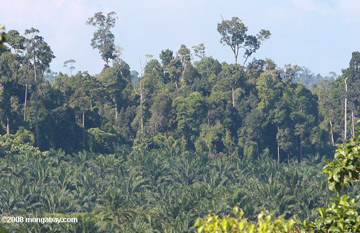On October 19th, Plantation Industries and Commodities Minister Tan Sri Bernard Dompok told parliament that oil palm harvesters and rubber tappers are living above Malaysia’s national poverty line, according to a story in the Malaysian Insider. But now representatives of the workers are saying Dompok lied.
“It is a blatant lie and it has been going on for a long time. The fact is misleading and confusing,” M. Sugumaran, Coordinator for the Plantation Workers Support Group, said during a press conference according to the Malaysian Insider. “The statement by the minister is in bad faith as it will (be) the reason for the people in the plantation to lose out the benefits given by the government to those who earn below the poverty line”.
 Palm oil plantation and rainforest in Malaysian Borneo. Photo by: Rhett A. Butler. |
Dompok stated that oil palm harvesters and rubber tappers made approximately 1,700 RM (500 US dollars) and 870 RM (257 US dollars) a month respectively. The rural poverty line in Malaysia is 720 RM (213 US dollars) a month.
However, according to a study by the Plantation Workers Support Group the average wage of oil palm workers was 700 RM (207 US dollars), below Malaysia’s poverty line.
The oil palm industry frequently makes statements that the industry has helped to alleviate poverty in Malaysia. However, the industry has had difficulty finding enough workers due to the low wages and rough working conditions. Many of the workers in Malaysia’s oil palm industry are immigrants from Indonesia and Philippines, some of whom are working illegally. Local conservationists also contend that these workers are paid so little they turn to forests for meat, setting out snares that catch species indiscriminately, including endangered species like sunbears, elephants, and rhinos.
Recently the UK banned an advertisement from the Malaysian Palm Oil Council (MPOC) because of misleading and unsubstantiated statements, including that the industry was ‘sustainable’ and contributed to ‘the alleviation of poverty, especially amongst rural populations’.
Oil palm is one of Malaysia’s biggest businesses: in 2008 the booming industry made 64.8 billion RM in exports (nearly 20 billion in US dollars). The industry says it has been essential for Malaysia’s economic development; critics contend that most of the profit ends up in the hands of a few and at the expense of the nation’s rainforests and natural resources.
Related articles
Palm oil developers in Papua New Guinea accused of deception in dealing with communities

(09/25/2009) Papua New Guinea, the independent eastern half of the world’s second largest island (New Guinea), houses one of the planet’s last frontier forests. These forests support a wealth of plants and animals as well as the Earth’s most diverse assemblage of cultures—some 830 languages are spoken in Papua New Guinea (PNG), representing more than 12 percent of the world’s 6,900. But PNG’s forests are fast-changing. Between 1972 and 2002 PNG lost more than 5 million hectares of forest, trailing only Brazil and Indonesia among tropical countries. Forest loss has been primarily a consequence of industrial logging and subsistence agriculture, but large-scale agroindustry—especially development of oil palm plantations—has emerged as an important new driver of land use change. Dozens of international companies have set up operations in the country over the past decade, including Cargill, an agribusiness giant based in Minneapolis. While Cargill says it is committed to sustainable and responsible palm oil production across its three plantations in PNG, the firm has been targeted by local and international NGOs, which claim it has polluted rivers and deceived local communities into signing agreements they do not understand. Some landowners say they are receiving few of the benefits oil palm promised to deliver, while losing their independence—they are now reliant on an export-oriented crop they can’t eat. Opposition to further oil palm expansion is now growing, especially in Oro Provice, where Cargill’s plantations are based.
Palm oil both a leading threat to orangutans and a key source of jobs in Sumatra

(09/24/2009) Of the world’s two species of orangutan, a great ape that shares 96 percent of man’s genetic makeup, the Sumatran orangutan is considerably more endangered than its cousin in Borneo. Today there are believed to be fewer than 7,000 Sumatran orangutans in the wild, a consequence of the wildlife trade, hunting, and accelerating destruction of their native forest habitat by loggers, small-scale farmers, and agribusiness. Gunung Leuser National Park in North Sumatra is one of the last strongholds for the species, serving as a refuge among paper pulp concessions and rubber and oil palm plantations. While orangutans are relatively well protected in areas around tourist centers, they are affected by poorly regulated interactions with tourists, which have increased the risk of disease and resulted in high mortality rates among infants near tourist centers like Bukit Lawang. Further, orangutans that range outside the park or live in remote areas or on its margins face conflicts with developers, including loggers, who may or may not know about the existence of the park, and plantation workers, who may kill any orangutans they encounter in the fields. Working to improve the fate of orangutans that find their way into plantations and unprotected community areas is the Orangutan Information Center (OIC), a local NGO that collaborates with the Sumatran Orangutan Society (SOS).
Britain bans palm oil ad campaign
(09/09/2009) Britain’s Advertising Standards Authority (ASA), a group that regulates advertisements, has again banned “misleading” ads by the palm oil industry, reports the Guardian. ASA ruled that a campaign run by the Malaysian Palm Oil Council (MPOC) makes dubious claims, including that palm oil is the “only product able to sustainably and efficiently meet a larger portion of the world’s increasing demand for oil crop-based consumer goods, foodstuffs and biofuels.” The ad said criticism over “rampant deforestation and unsound environmental practices” were part of “protectionist agendas” not based on scientific fact. ASA held the ad breached several of its advertising standards codes, including “substantiation,” “truthfulness,” and “environmental claims.” In rebuking the MPOC, the ASA said that the merits of new eco-certification scheme promoted by the palm oil industry is “still the subject of debate” and that the ad’s attacks on detractors implied that all criticisms of the palm oil industry “were without a valid or scientific basis.”
World Bank’s IFC suspends lending to palm oil companies
(09/09/2009) The World Bank has agreed to suspend International Finance Corporation (IFC) funding of the oil palm sector pending the development of safeguards to ensure that lending doesn’t cause social or environmental harm, according to a letter by World Bank President Robert Zoellick to NGOs. A recent internal audit found that IFC funding of the Wilmar Group, a plantation developer, violated the IFC’s own procedures, allowing commercial concerns to trump environmental and social standards. The findings were championed by environmental and indigenous rights’ groups who have criticized World Bank support for industrial oil palm development which they say has driven large-scale destruction of forests in Indonesia, boosting greenhouse gas emissions, endangering rare and charismatic species of wildlife, including the orangutan, and displacing forest communities.
World Bank violated environmental rules in lending to palm oil companies, finds internal audit
(08/18/2009) A coalition of indigenous rights’ organizations and green groups is calling on the World Bank’s International Finance Corporation (IFC) to suspend lending to oil palm plantation developers over revelations by its own internal auditors that the loan-making entity failed to follow its own procedures for protecting against social and environmental abuses.
Issues around palm oil development prove complex, controversial
(08/12/2009) A new report from published by the Center for International Forestry Research (CIFOR) highlights the benefits and controversies of large-scale expansion of oil palm agriculture in Southeast Asia. The review, titled “The impacts and opportunities of oil palm in Southeast Asia: What do we know and what do we need to know?”, notes that while oil palm is a highly productive and profitable crop, there are serious concerns about its environmental and social impact when established on disputed land or in place of tropical forests and peatlands.